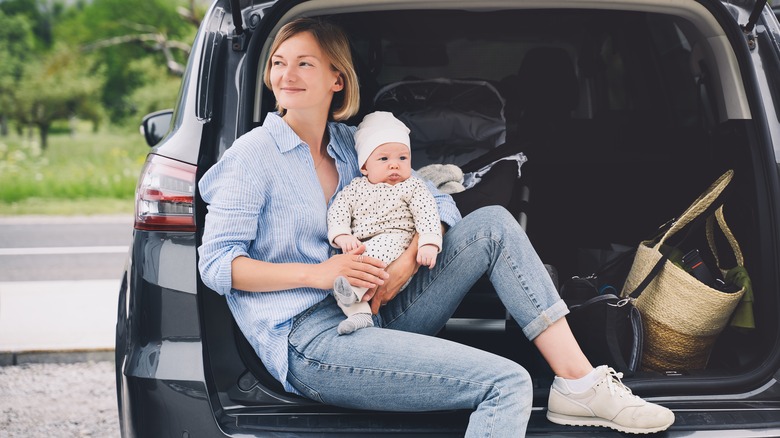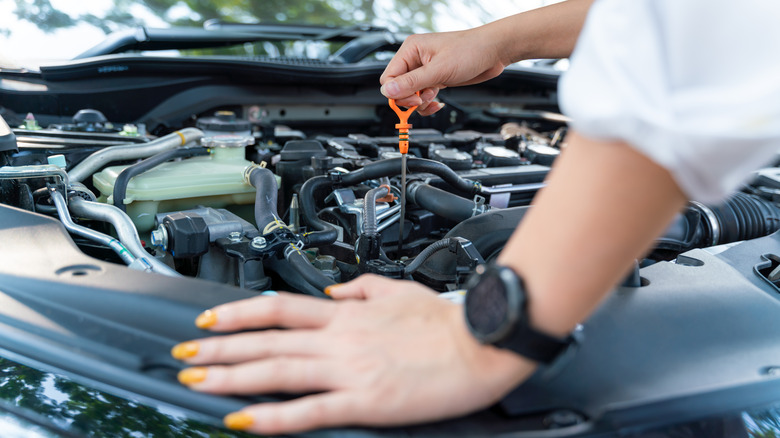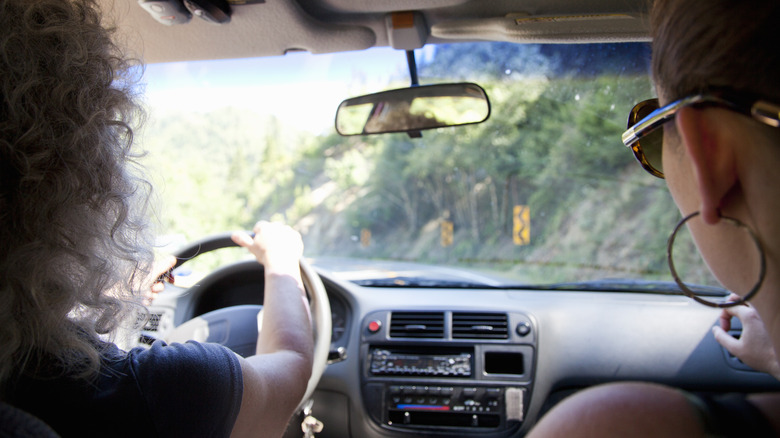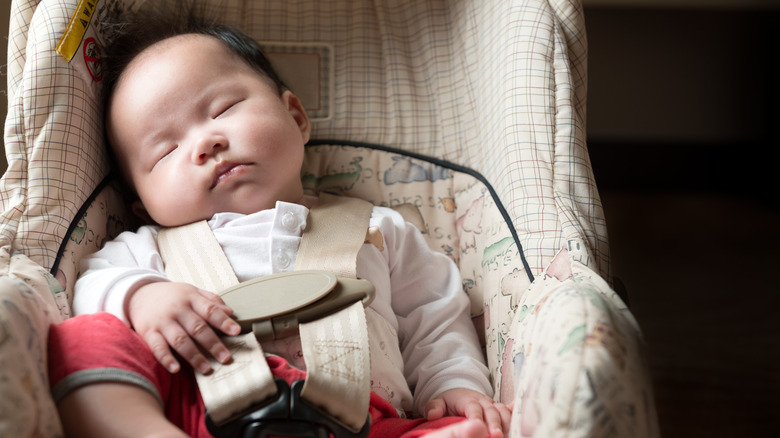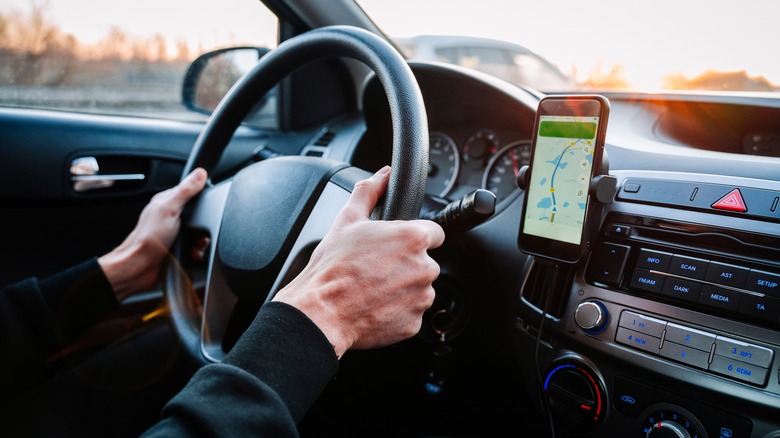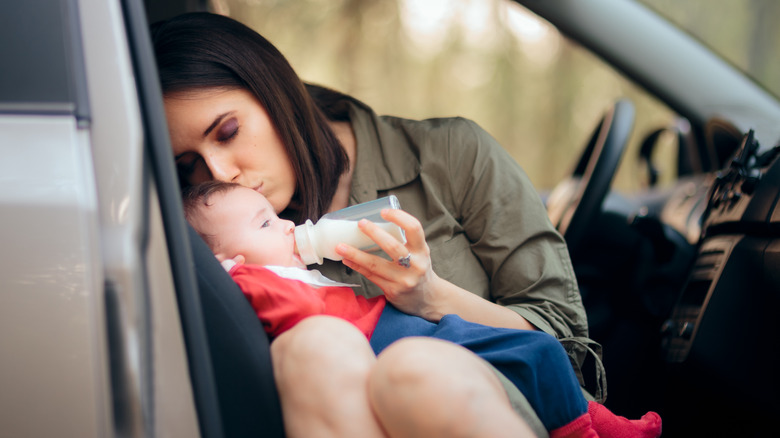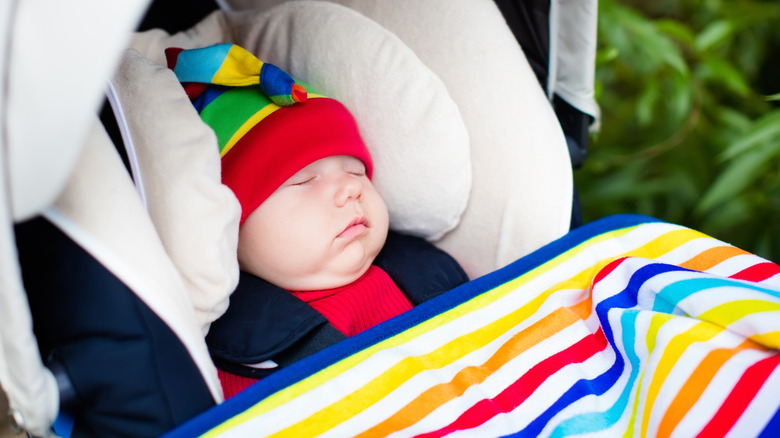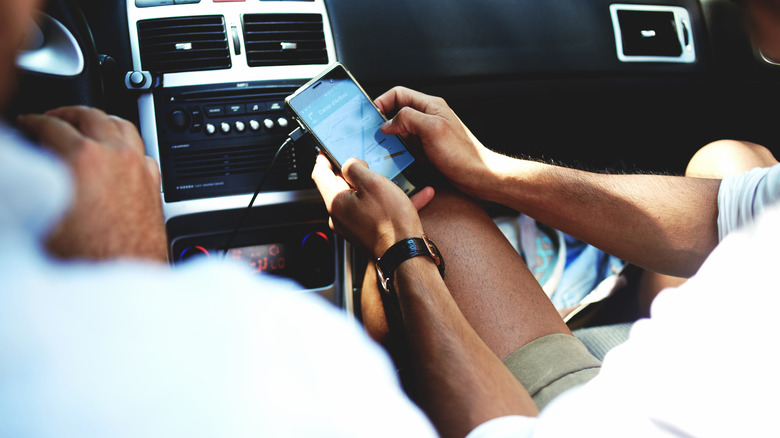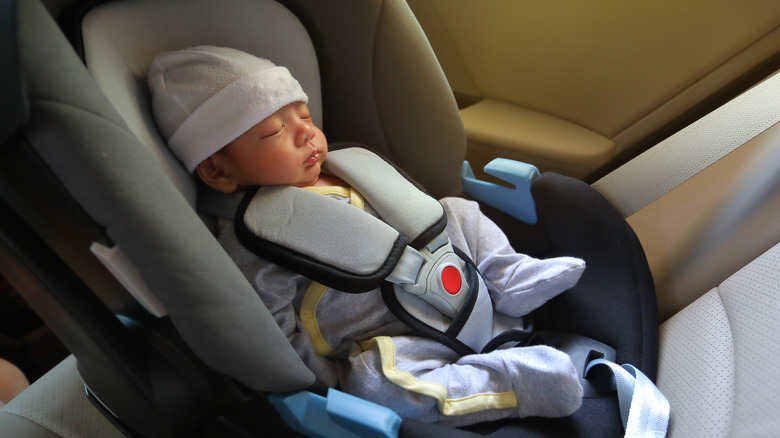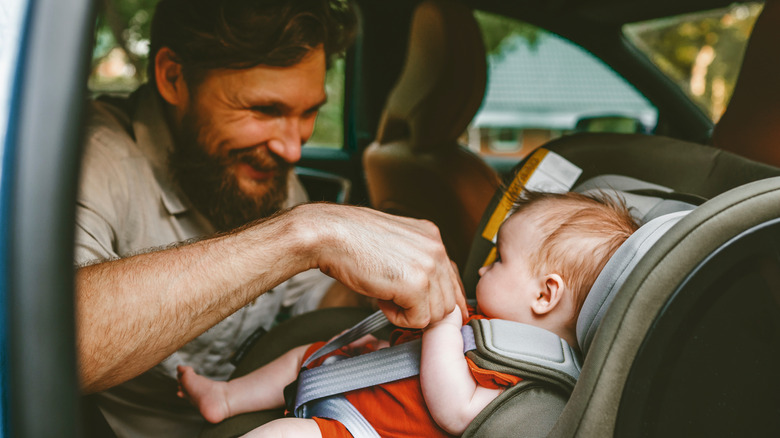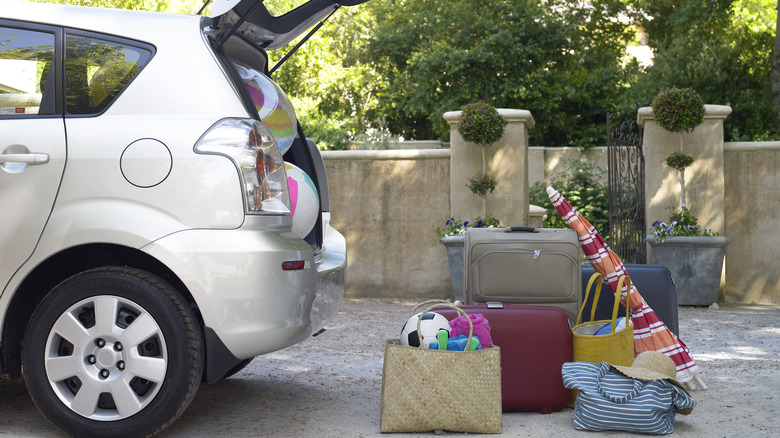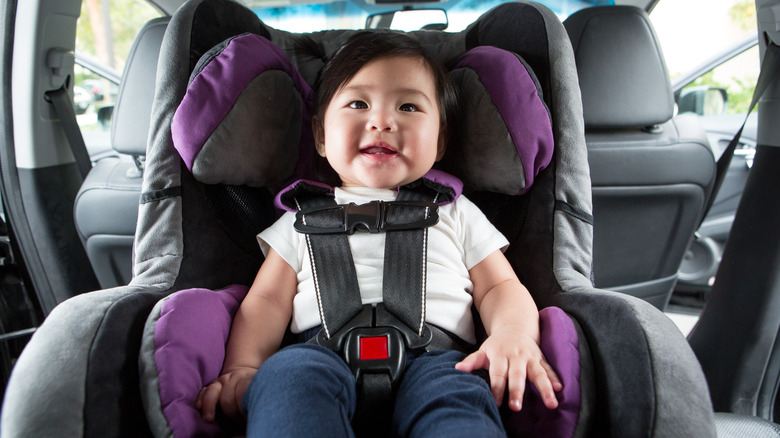Tips For Making Road Trips With Your Newborn Less Stressful
The travel bug hits at every stage of life, and globetrotters don't have to stop traveling when they become parents. In fact, sharing the joy and passion of traveling with your little ones adds a lot to the whole experience – but it does take some extra planning and fine-tuning to get it down pat. Traveling via plane with a newborn in tow has its own hurdles, but road trips in particular can be especially tedious.
In fact, many may feel like taking a long car trip with their new baby would be next to impossible, but it's manageable with the right kind of planning! Plus, it only gets easier with practice and exposure to the experience. Travel Mad Mum's founder Karen Edwards hypes up the use of maternity leave to establish a love for traveling while having uninterrupted family time with a new baby.
Road trips offer a unique experience to travelers, and that is being actively involved in the route, both planning and traversing many different cities and landscapes. In order to help you do so with your newborn baby in the backseat, we've compiled a list of tips for a less stressful long-haul drive – good luck!
Get your car checked before heading out
It's important to cover all your car's general maintenance before you go on a high mileage trip, but it's even more important when you've got the added responsibility of toting a child along as well. There's nothing worse than being stranded in a strange place while you're supposed to be enjoying a vacation – except maybe being stranded with a newborn.
Whether you speak "car" and can get under the hood yourself or need to take it to a certified shop, Honest Accurate Auto's checklist of maintenance items should be of the highest priority before you head out on a long car adventure. Undertaking a road trip in the United States? It's not a bad idea to check the traffic laws in the states you will be driving in.
Your vehicle isn't the only thing that needs a once over, though, as your child's car seat is just as important to his or her safety. Before bringing your baby home, it's a great idea to be fluent in car seat safety and how to properly install your child's car seat, and checking it before a long trip is a great idea too! Even if you feel confident in your installation abilities, getting a second look from a certified car seat specialist is a solid decision as well. If you checked these boxes before bringing your baby home, doing so again before hitting the road could bring you some much-needed peace of mind.
Have a travel partner
Whether it be a significant other, co-parent, or just a good friend, traveling with a little one will be immensely easier with someone there to share the load. Driving an entire road trip by yourself is tough to begin with, and when you add a newborn in that mix, it becomes a very slow-going affair. Having someone to swap off driving duties will allow someone to sit in the backseat with the baby if need be. Human interaction is important to new babies and there will likely already be a decrease of such compared to if you were at home.
If Baby gets fussy, one person can do a number of car- and baby-friendly activities in the back seat. Picture books, hand puppets with colorful characters, and peek-a-boo are great ways to interact with a newborn every day, and they can be great devices for distracting a baby who may not be thrilled about being stuck in a car seat.
While it's certainly possible to road trip with a newborn by yourself and some travelers, like travel blogger Anna Everywhere, find solo traveling with a baby pretty easy, most prefer to bring along some help. Not only will it be easier to care for a newborn with a couple of extra hands, but the physical act – and let's face it, burden – of driving long distances will be a shared one.
Plan frequent stops
To travel safely with a baby, you'll typically need to stop every two to three hours. Car seats are made to keep children as safe as possible from accidents and jerky motions while in a car, but they are not meant for long-term containment. They are also not safe sleep environments, though there are some general guidelines you can follow to make them as safe for sleep as possible during a long car ride – because if your baby is in a moving car, they need to be in a car seat, whether asleep or not.
Though it's recommended to stop frequently anyway so the driver can stretch and move from the driving position, stopping just as often is vital for the safety of your newborn. Stopping around every two hours – or up to five during Baby's night sleep – will allow you to feed and change the babe as well as take care of any other needs you or your little one may have.
While it can be hard to tell exactly when the best times to stop will be, having possible points of interest along the way can really help when it comes to planning your road trip. Depending on what your route looks like, there may be certain areas where pulling over isn't easy, safe, or convenient. By using two to three hours as a general guideline, you can mark potential breaks that will fit your needs.
Travel around your newborn's schedule
Life with a brand new baby – or any young child, really – is tough, but it becomes a lot easier when you schedule your life around their needs. This goes double for traveling with a new baby. Planning your heavy travel times to coincide with their sleep schedule is vital for getting the most out of your time. This can be difficult with newborns specifically, for the simple fact that they probably haven't been around long enough to get into a routine.
Be that as it may, taking advantage of sleep times as they come will be huge for the overall ease of the trip. Try to plan the bulk of travel around your little one's main sleep time – for most parents, this comes at night. Starting your journey when you would typically put your little one down for the night is a great tactic and probably has the highest likelihood of having success right out of the gate. Take advantage of nap times as well, planning pit stops along the way to line up around the time the baby should be waking up.
Most parents know that babies can and will wreck even the most well-orchestrated of plans, so it would be wise not to rely on your baby sleeping as well as they do at home. With that being said, though, there are some steps you can take to help Baby sleep on the road, like incorporating part of their at-home bedtime routine.
Plan your route carefully
Along with traveling as much as possible while the babe is sleeping, finding one of the shortest possible routes will make your drive much more enjoyable for both you and your baby. Unless there is a specific attraction or stop you want to make along the way, taking the scenic route could not only increase your drive time but increase the time in which your little one is stuck in the car and could get unhappy with that situation.
Google Maps and Google My Maps can both be great tools for planning a road trip, as they allow you to look at different routes and what kind of stops you can make along the way. Joining parenting groups on Facebook or Peanut is also a great way to get information on what stops may be easier and safer on your trip. Asking goes a long way, and other parents in your area or the area you will be traveling in will probably be more than happy to help make your journey a safe and successful one.
Shortening your drive time doesn't automatically mean that your travel time will be shorter, though, as you may still have to stop pretty frequently, possibly even more than the allotted every two hours. The most important thing is that you and your little one have a happy and safe road trip, and taking the shortest route while also strategizing stops may just be the formula for an easy-going drive.
Be strategic about feeding
This one is for breastfeeding moms, especially all the pumpers out there. One of the difficult things about having a newborn in general is nursing on demand — newborns and babies alike have tiny bellies and need to feed often, especially when they are exclusively breastfed. While breastfeeding moms will most likely need to stop often to feed, there may also be the chance that your baby will sleep for longer periods in the car and overall have lengthier naps. When this happens, it is helpful to have a hands-free pump that will allow you to drive and pump with little effort so that your milk supply doesn't suffer from the extended time between feeds.
Things can get more complicated on the road with formula or bottle-fed babies, but it's still manageable! Pack extra of everything, as you will be away from the kitchen for a period of time. Bring enough supplies for your journey as well as any delays, and a secure cooler is pretty much necessary for any stored breastmilk. Lining the cooler with aluminum foil will help keep things cold, just remember that breastmilk can't be refrozen unless ice crystals remain in the milk.
For breastfed and formula-fed babies alike, it is never safe to feed in a moving vehicle, or even while the baby is strapped in a car seat as that presents a choking hazard. It's best to use feeding time as a break from the car altogether.
Bring a piece of home with you
Babies love routine and stability, which is the exact opposite of a road trip. All the comforts they know are out of reach, whether it be their preferred care provider or the environment they have seen all of their short life. By bringing something that smells like their mom or dad and placing it near them, they may be able to find a little more comfort than they would if going without.
Babies typically spend 40 long weeks in their mothers' bellies, and they don't have room to do much but grow. They do, however, have plenty of time to get to know their mother's scent. Experts speaking to Romper say that within just a few days, babies are well versed in all the smells their mother in the outside world has to offer them. Newborns get to know their fathers' or other close care providers' scents as well, though it takes a little more time for that correlation to develop.
Newborns find comfort in their care providers, so it only makes sense that giving your little one something they are familiar with that has the scent of their very favorite people will bring them some peace on a road trip, which very well might be the longest they've gone without being in their mother or father's arms. If all else fails, though, stopping to hold your baby if they need it is always an option.
Keep everything within arm's reach
It's helpful to keep everything that you could possibly need while sitting in the driver's or passenger's seat just an arm extension away. While it may not be the end of the world to have to stop the car or rearrange things on a normal road trip, if you're traveling with a sleeping baby, avoiding an untimely wake-up just might make a few hours' difference in arrival time. Any abrupt changes in speed or smoothness while driving has the potential to wake a newborn, as new parent Reddit users have found, so stopping is a pretty risky maneuver if you want to let sleeping babies lie.
If you're unsure about all the things you may need to keep nearby, More Than Just Parks has a great pack list for the front seat during road trips. While you may remember your phone and wallet, a car charger or chapstick might escape your mind when packing for both yourself and a baby.
Bring extra of the essentials
While it may be easy to think you'll be able to grab supplies somewhere on the road, don't make a trip to the grocery store a necessity. Make sure you are bringing an ample supply of diapers, wipes, and formula/breast milk. One blowout in the car seat could have you wishing you had brought more of the essentials, and you don't want to be adding miles to the grocery store to your already long road trip.
Of course, having the option of heading to a grocery store is a great backup plan, though it is preferable to pack plenty of everything you and Baby need. Creating a packing list could be pretty helpful in avoiding the grocery stores during your travel days on a road trip. Also, don't forget to pack yourself and any traveling partners some road trip-friendly snacks — it's easy to forget that you need food too when the stress of packing enough formula or breastmilk is heavy on the mind.
Use a baby mirror
While children are much safer rear-facing in the car and newborns are required by law to be in a rear-facing seat, not being able to see your little one is certainly nerve-racking, especially when it comes to long drives. Installing a secured baby mirror can not only bring you some peace of mind on a road trip, but also allows for the babe to have more than the seat headrest to look at.
This suggestion comes with a warning, though, as baby mirrors can be a distraction for the driver. You will be pushing the limits of the time your baby should be in a car seat, so a mirror on a road trip could be a great way to make sure your baby is still safe. While mirrors certainly shouldn't be relied on for safety and shouldn't be used often enough to be a distraction, they may be a good tool to ease the mind of a stressed-out parent in the driver's seat on long car rides. Reddit users seem to be in agreement with their effectiveness, with the majority of commenters on one thread about the product singing the praises of the use of car mirrors for their new babies.
When in doubt -- distract!
You may get away with traversing the bulk of the journey while your little one is asleep, but chances are high that your baby will be awake for part of the drive. While some babies are content to sit by themselves and watch the world around them, it is likely that waking hours will involve a little bit of fuss. When this is the case, distraction is key!
If all of Baby's needs are met, the best way to put a smile on the face of a tiny human is to act completely ridiculous. During long car rides, your little one will absolutely get bored. One way to distract from the dull and somewhat lonesome drive is to get silly – and there are actually quite a lot of benefits to being silly with your children other than keeping them entertained in the car.
Of course, being goofy isn't the only solution for a bored baby. There are plenty of activities you can do with a newborn in the car, as long as you have brought along a traveling partner. With one person up front driving and one in the back seat with Baby, board books, favorite toys, and a game of peek-a-boo can be very effective in diverting your child's attention from the fact that they are still limited to their car seat.
Sing, talk, and tell stories
When playing games and using some of your baby's toys from home doesn't seem to work in comforting a fussy travel companion, using your voice is another simple solution that may help. Singing, telling stories, or talking about just anything is a great way to comfort your baby, especially for travelers tackling a road trip with a baby alone.
You are your baby's whole world, and they don't want to be separated from you. This is one of the reasons a baby may hate being in the car seat, but you can make it more comfortable and enjoyable for them if they can hear a constant stream of your voice from the front seat. While pretty much everything is new to babies, they actually start hearing while they're still in the womb and can recognize voices from those who were closest to them, so it only makes sense that they'd find comfort in hearing their mother's voice and different sounds.
While there are songs that your baby would love to hear you sing, appeasing your baby could be as easy as talking to them. If you're unsure about how to talk to your baby, it's really as easy as just talking about anything that comes to mind or narrating what you are doing — you can't mess up, they're just a baby!
Have a go bag ready
While you'll probably already have plenty of things packed for you and your baby, it's helpful to keep a smaller bag separate from your main pack with everything you may need for a full 24 hours with the baby. This includes diapers, wipes, bottle/pump parts, and clothes. Anything you need for yourself and the baby for one night outside of the car should be in a separate bag, that way any stops you make along the way or hotel stays don't require you to lug in all of your belongings plus a baby carrier.
This helpful suggestion, along with Frommers' other packing tips for road trips, will save you a lot of time and stress when it comes to any stops before getting to your final destination. You certainly will not want to be rummaging through your travel bags for everything you and Baby will need and making two trips from the car to the room with Baby in tow will more than likely zap your remaining energy.
Lower your expectations
Let's be real here, babies are unreliable travel partners. It's impossible to plan for everything, especially when you are responsible for a tiny human who can not communicate their feelings or needs very well. Be prepared to add a couple of hours on your already loose timeline for a long car ride, maybe even a couple of days if you're traveling across country, because sometimes it's better to just admit defeat and hunker down for the night so that you and Baby can have some semblance of normalcy amid a huge change in routine.
In fact, according to mom blogger Wine & Quill, if you start with your expectations on the floor, you'll have a wonderful trip full of pleasant surprises. For instance, if you fully plan on your little one crying for the majority of the drive and stopping every hour to care for the babe and play, you'll probably walk away with a much better experience than if you plan for your baby to follow an itinerary and sleep like, well, a baby.
